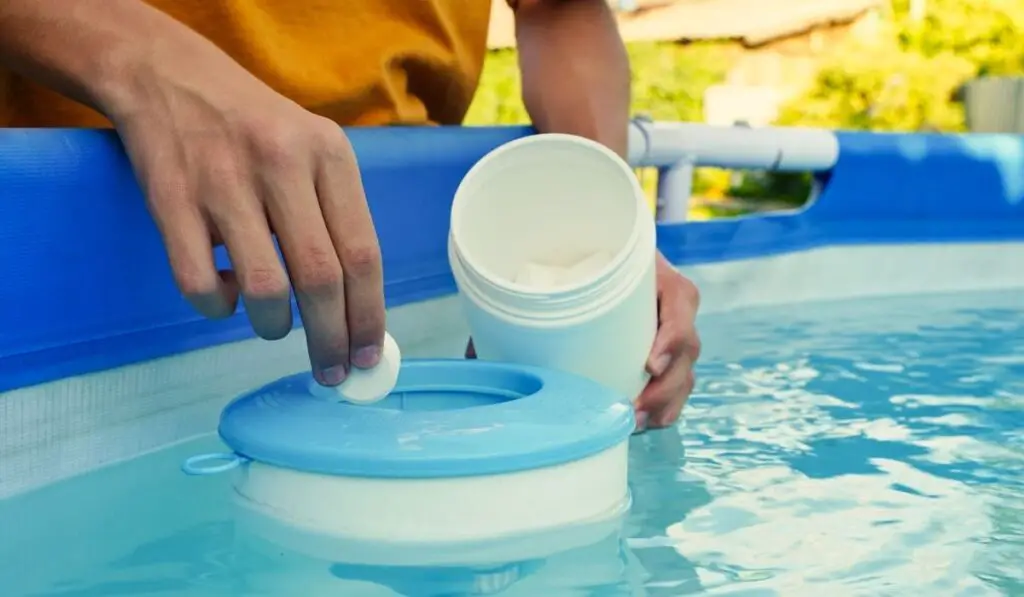If you’ve ever owned a pool and had to deal with the maintenance that comes with pool ownership, you’ve probably had to deal with keeping algae at bay. It forms in stagnant water and it’s a constant battle to keep it away from the pool, as it’s unsightly. However, can it harm you?
While pool algae itself can’t cause any harm to you, bacteria that form to feed on the algae certainly can. They can cause skin issues, infections, and gastrointestinal issues. They’re dangerous when swallowed or aspirated, or when they come into contact with open wounds.
Let’s take a closer look at the harm that common pool algae can cause to your body as well as how to prevent it from happening.
Will Pool Algae Harm You?

The good news is that pool algae itself is harmless to people. However, the issue is that the bacteria that then feed on the algae can cause various problems.
Skin Issues
The most common problem you’ll get from swimming in algae that has bacteria feasting on it is skin issues. You might notice rashes in the skin and, if the bacteria is particularly abundant or aggressive, it may cause breaks in the skin.
Infections
If these breaks in the skin do occur or you already have open wounds, you could find that the wound gets infected. If this happens, it’s essential to see a medical professional, to make sure the wound is cleaned up and you get antibiotics for that infection.
There could also be infections if the water gets into the eyes and ears, which is difficult to prevent when swimming.
Gastrointestinal Issues
If you accidentally consume the water, you may find that you have problems with diarrhea, vomiting, and stomach pains. This is another time when you should see a medical professional to get treatment and prevent the inner infection from becoming any worse.
Most people recover from these issues quickly, but it’s better to avoid complications.
Common Algae Found in Pools
For the most part, the only algae you’re likely to find in pools is green algae. Other bodies of water can have more toxic forms, such as blue-green algae, and you should stay well away from this.
Light green algae are generally algae that are freshly formed and easier to get rid of. As the color deepens, that means it’s been there for a while and it’s best not to get into that water until you’ve gotten rid of it.
Is It Safe To Swim in a Pool With Algae?
It’s hard to say if it’s safe to swim in a pool with algae. If it’s a light green color, that means it’s newly formed and probably doesn’t have a lot of bacteria in there yet, so you likely won’t suffer from any issues — especially if you have no open wounds and are careful not to ingest it.
However, a deep green color means it’s been there for a while and it could be dangerous. Overall, it’s better to get rid of any algae before you take a dip.
How to Remove Algae From a Pool

For the most part, you should remove algae from the pool as soon as you see it, before there are any issues. Here’s how.
Algaecide
You can buy algaecide (on Amazon) which is specifically formulated with chemicals to kill off algae. This can be used preventatively or to kill off algae that are already in the pool.
Shock the Pool
Shocking the pool with chlorine (on Amazon) can be very helpful for getting rid of algae and any other toxic things. Make sure you follow the instructions about when it’s safe to swim after shocking the pool, as this involves adding far more than the normal amount of chlorine to the water.
Brush the Walls
Make sure you have a pool brush (on Amazon) and are always scrubbing the walls on a regular basis, even if you don’t see any algae forming. This will make sure it doesn’t have a chance to form.
Run the Filter
Even when you’re not using the pool, run the filter on a regular basis. Algae likes stagnant water and even when you aren’t using the pool in the winter, it will be attracted to the idea of settling there. Keep the water moving!
